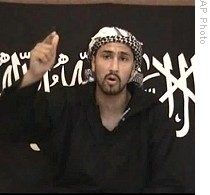London
07 September 2009
Three British Muslims have been found guilty of conspiring to kill thousands of people three years ago by blowing up trans-Atlantic jetliners with liquid explosives.
 |
| Undated frame grab taken from video described by British prosecutors as suicide video and provided by Metropolitan police, shows Abdullah Ahmed Ali (File photo) |
The court heard that seven flights were being considered by the group in what would have been the largest terrorist attack since September 11, 2001.
Prosecutors say the men planned to smuggle liquid explosives onto the planes disguised as soft drinks. The devices would have been assembled in airplane toilets and detonated by suicide bombers.
It is said the planned attack was guided by senior militants in Pakistan who hoped to mount a so-called 'spectacular' strike against the West.
Ring leader Abdullah Ahmed Ali was found guilty along with colleagues Assad Sarwar and Tanvir Hussain.
Shortly before his arrest just more than three years ago, Hussain, along with the others recorded so-called martyrdom videos.
"And I only with that I could do this again, come back again and do it again and just do it again and again until you know, people come to their senses and they realize, realize you know, do not mess with the Muslims," Hussain said.
Scotland Yards Anti-Terror chief, John McDowall says had the plot been carried out, it could have been devastating.
"This was a hugely significant attack plan. With that number of aircraft, with the types of destination that were being talked about, it is conceivable to think of upwards of 2,000 casualties in the air depending on the point of detonation whether others would have been caught on the ground as well. These were just horrendously large numbers of potential fatalities," McDowall said.
Because of the plot, sweeping security changes were brought into the airline industry, including restrictions on carrying liquids on planes that persist to this day that many passengers just have to cope with.
"I cannot travel with my hair products, a lot of make up, a lot of different things that you would not think would be a problem," one passenger said.
Five other defendants in the London trial were acquitted.
All of the men say they never intended to bring down any planes, but rather they wanted to unleash a series of harmless stunt explosions on famous landmarks here to in their words, "expose the failings of Western foreign policy."